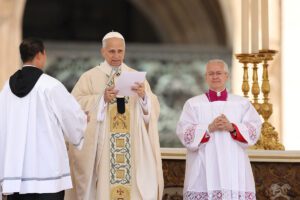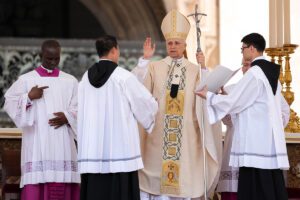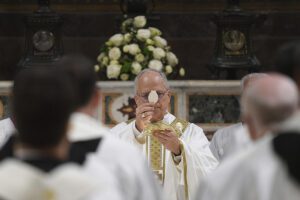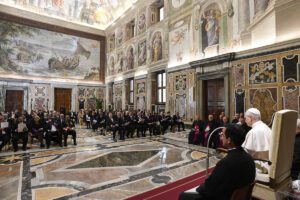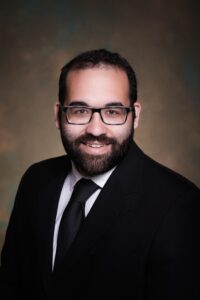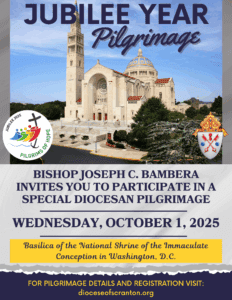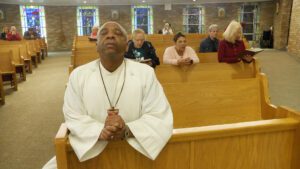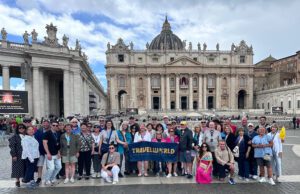VATICAN CITY (CNS) – Pope Leo XIV met privately with Ukrainian President Volodymyr Zelenskyy and his wife May 18, their second encounter of the day.
In fact, when the pope welcomed the president to his office attached to the Paul VI Audience Hall, a Vatican video clip included Pope Leo telling the president, “Nice to see you again.”
And, when the two sat down at the pope’s desk, the pope said, “Thank you for your patience,” apparently in reference to the time between the end of the pope’s inauguration Mass, when he greeted Zelenskyy and other government leaders, and the start of their private meeting.

The Vatican press office said it did not have a statement about the meeting, but Zelenskyy thanked the pope in a posting on X.
“For millions of people around the world, the Pontiff is a symbol of hope for peace. The authority and voice of the Holy See can play an important role in bringing this war to an end,” Zelenskyy posted.
“We thank the Vatican for its willingness to serve as a platform for direct negotiations between Ukraine and Russia,” Zelenskyy said. “We are ready for dialogue in any format for the sake of tangible results. We appreciate the support for Ukraine and the clear voice in defense of a just and lasting peace.”
Pope Leo and Zelenskyy had spoken by telephone May 12, and Pope Leo already has prayed publicly for the Ukrainian people several times, calling for “a just and lasting peace.”
The Vatican also offered to host direct discussions between Ukrainian and Russian representatives.
Cardinal Pietro Parolin, Vatican secretary of state, had told reporters on the sidelines of a conference May 16 at the Augustinian Institute in Rome that the failure of planned talks May 15 in Istanbul was “tragic.”
“We had hoped a process, even if slow, could be started” to reach a peaceful end to the conflict, the cardinal said. “It seems like we are starting over again.”
As for a Vatican mediation offer, Cardinal Parolin said that the Vatican has said it is available as a place for representatives of Russia and Ukraine to meet. “This is what we are aiming for, where we hope to get to: that the two sides meet and begin direct negotiations. At least that they start speaking to each other.”
Zelenskyy, who met in Rome with U.S. Vice President JD Vance and Secretary of State Marco Rubio after meeting the pope, said he also spoke to them of the importance of serious negotiations with Russia.
Referring to his meeting with the U.S. officials, Zelenskyy said on X: “During our talks we discussed negotiations in Istanbul to where the Russians sent a low level delegation of non-decision-makers. I reaffirmed that Ukraine is ready to be engaged in real diplomacy and underscored the importance of a full and unconditional ceasefire as soon as possible.”
“We have also touched upon the need for sanctions against Russia, bilateral trade, defense cooperation, battlefield situation and upcoming prisoners exchange,” Zelenskyy’s post continued. “Pressure is needed against Russia until they are eager to stop the war. And, of course, we talked about our joint steps to achieve a just and durable peace.”
The Ukrainian president also thanked “all American people for the support and leadership in saving lives.”
Rubio had met May 17 with Cardinal Matteo Zuppi of Bologna, Pope Francis’ envoy for peace in Ukraine. The cardinal particularly has been working to facilitate the exchange of prisoners of war and the return to Ukraine of children forcibly taken to Russia.
“We thank the Holy See for its willingness to be involved in this process,” Rubio told reporters after the meeting. He said he would not describe the Vatican’s position as an offer to “broker” a peace deal, “but it certainly is a place that I think both sides would be comfortable” coming to.
“We are grateful for their longstanding efforts, not simply on trying to broker peace but on the exchange of prisoners,” Rubio said, adding that “there are children who have been taken from their homes that the Ukrainians would like to see returned, and the Holy See has been very involved in that regard.”

